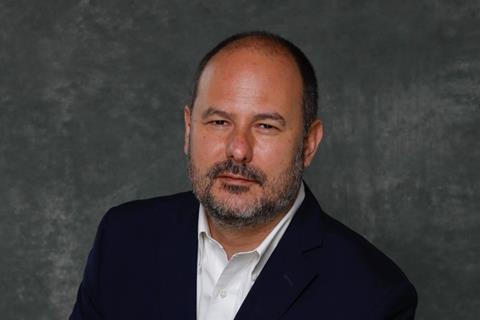
Film and TV powerhouse Fremantle has had a busy year. It has added leading UK-Irish outfit Element Films and Italy’s Lux Vide, among others, to its growing portfolio of top-notch international production outfits, and has 33 features on its slate, including Angelina Jolie’s Without Blood, which was based at Cinecitta Studios in Rome.
Italy-based Andrea Scrosati, Fremantle COO and continental Europe CEO, talks to Screen about how the company works to bring all of its partners together, the different way it invests in projects and companies and why the company is very interested in Latin America.
What can we expect next?
All the M&A we have done has always focused on ensuring a strategic cultural fit. To be clear, this doesn’t mean we have one single cultural view, quite the opposite since we span 24 countries and across multiple languages. But it’s all about collaboration across our system. Our producers are very independent and also very entrepreneurial, but we collaborate constantly, and this is precisely the area where we add value. Otherwise it simply becomes a financial transaction. We look for companies where we can add value, and at the same time they add value to our group.
The LatAm territories are culturally fascinating. They are very different among themselves, and creatively vibrant. We already operate in the area through Fremantle Latam operations, and also have an investment in [Camila Jimenez and Silvana Aguirre’s production outfit] The Immigrant which is based in LA but operates in Latin America.They just delivered a wonderful movie called Adolfo that was shot in Mexico, and they also operate in Colombia.
How are you integrating all your acquisitions?
We understand that in a creative business the classic ‘top down integration’ approach doesn’t work. The job of the producer is to form a creative exchange and add value with the talents that we work with. All our projects are founded on teamwork. Our job is to always bring people to the room that can add value. If there is only one person in a creative group that actually adds value and the others are only there to take notes, it simply doesn’t work.
People need to engage in a cultural and intellectual exchange. You want to have someone saying, ‘I understand your vision but actually I think there is a better way to deliver that vision’. That is the role of the producer, and the talents we work with do exactly that: Andrew Lowe and Ed Guiney from Element, Nico Hoffmann from Ufa, Lorenzo Mieli from The Apartment, and Mario Gianani from Wildside, just to mention a few. Fremantle would be nothing without them.
Our job as a group then is to give them infrastructure, facilitate relationships with the buyers, contacts with the talents, the writers, share production insights. We have writers that span across our system. For example the writer of L’Immensità [Francesca Manieri] is now working on a drama with another of our labels.
We also provide financing, but this is just one part of the process. If we were just doing gap financing, we would just be a distributor. Don’t get me wrong, this is a fundamental part of our business but as I say it is a part.
What are the different ways you work with companies?
We are operating many different financial models. Some are similar. Some are based on cash-flow, some are gap finance, we started to do studio financing where this makes sense, and others still partial financing. Every project is a project in itself. Each one is time consuming, given the amount of intellectual thought that goes into each project. But this is how you really add value.
For example the job of Raffaella De Angelis [literary acquisition lead in Fremantle’s drama business], who works in Christian Vesper’s global drama team, thanks to her relations with writers, she accesses book manuscripts months before they even go to print. She is able to say before a book is actually published whether there is an IP value there and then shares this intel with our producers, based on her knowledge of what soft spot each producer has.
RTL Group, which owns Fremantle, has indicated it aims to increase the company’s full-year revenue target to €3bn by 2025. Are you on track to achieve this?
We are working in the direction indicated by our shareholder that has been incredibly supportive of Fremantle, and we are on track. Going from eight to 33 films is a good example of the direction we are heading in.
What is your vision for the next three years?
The strategic direction for Fremantle is designed and led by our group CEO Jennifer Mullin and is the result of teamwork that starts with our shareholder vision, the leadership group, and the input that we get from our producers and leaders across the world. Without being a team, it just would not work.
Our vision as a team is to be the place creatives calls home. We do not want to be the place creatives want to sign up with, but the place they want to call home, and this makes a real difference in everything we do.
We have come a long way in past years, and have massive projects in the pipeline for coming years, however despite all these developments, it is important to say that unscripted entertainment still remains the foundation of our business. Not only because unscripted delivers the majority of our revenues but without our entertainment business it would have been impossible for Fremantle to become such an important player in the scripted world.

























No comments yet